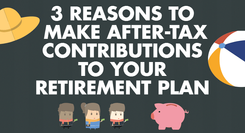Related Posts
Employers and Organizations
Does Your Financial Wellness Program Teach the Right Spending and Savings Priorities to Your Employees?
Last Update: April 24, 2023
Study after study shows that employees are financially stressed. This was true before the pandemic and is even more true since the pandemic. Schwab’s 2021 Modern Wealth Survey1 found that over half of Americans (53%) were financially affected by COVID, including one-third that simply felt the strain of the economic environment even if they were not laid off or didn’t face reduced hours.
Because of the pandemic, your employees have begun to shift their priorities. Over half (54%) state that financial health matters more.
As employers work to help their employees achieve financial health, it is important that the financial wellness program used reflects employee needs and provides ways to increase healthy financial habits.
Optimism Despite Concerns
Although Americans remain concerned about the virus and the economy, a majority feel optimistic. Three out of five feel good about the stock market, and half feel positive about the job market and economy.
Additionally, three out of four feel confident that the US will continue to lead in technological innovation as a way of keeping our economy strong.
A good portion of this optimism stems on the fact that most things have gotten back to normal. Employees are able to travel, socialize, dine out, and host parties again.
However, they learned a few lessons that will change how they approach their personal finances.
Continuing to Save and Invest
Of those surveyed, 64% said they saved more money than they had in previous years. Eight out of ten plan be savers rather than spenders.
- 45% plan to save more money
- 34% plan to reduce debt
- 28% build an emergency fund
Your employees are also looking at investing, but as a way to increase emergency savings. During the pandemic, 40% of those with emergency savings had to use their savings, and three out of four used half or more of their savings2.
These employees saw the benefit of having emergency savings and want to be sure that the account they have for the future is substantial enough to handle any crisis.
Additionally, four out of ten employees hope to invest to save for retirement. The 2021 Natixis Global Retirement Index3 found that 59% of Americans feel they will not be ready to retire on time, and 39% believe they will never have enough money to retire.
The same study found that during the pandemic, 13% of Gen Y and 15% of Gen X reduced their retirement plan contributions, while about one in ten withdrew money to make ends meet.
Keep Reading: 1 in 3 Americans Plan to Delay Retirement – 10 Tested Ways a Director of Retirement Can Help Get Them Back on Track
Helping Employees Plan
Although your employees are primed to save more money and reduce their debt, the truth is that many have no idea how to start. The Schwab survey found that only 33% of Americans have a written financial plan, and here’s why:
- 22% – too complicated
- 19% – not enough time
- 42% – not enough money to need a plan
However, having a plan is the biggest driver of confidence in reaching financial goals. The Schwab survey found that 54% of those with a financial plan feel very confident while only 18% of those without a plan feel that way.
They also found that having a plan increases your employees’ likelihood of participating in healthy financial habits. Looking at those with a plan vs those without, Schwab found that:
- Had an emergency fund: 65% vs 33%
- Pay off credit cards in full: 47% to 29%
- Make loan payments on time: 47% to 29%
- Regularly rebalance investment portfolio: 87% to 63%
- Understand investment fees: 71% to 45%
Schwab’s findings show how important it is for your employees to begin with a plan.
The financial wellness program you use should help employees see the benefits of creating a plan regardless of their current financial status. It should also make the process easy to understand and allow them to begin creating their plan using incremental steps.
Enrich offers a financial wellness plan that is customizable, personalized, and convenient. The platform is available to employees on any device at any time and guides employees to take small steps to improve their financial wellness.
Internal data from one Enrich user found that 32% more employees increased their savings, 27% more had a fully-funded emergency savings account, and 10% more contributed the maximum amount to their retirement plan, thus helping employees achieve the goals they say they have.
Download Enrich's Financial Wellness Behavior Change Data: a 12-Month Study
1 - https://content.schwab.com/web/retail/public/about-schwab/schwab_modern_wealth_survey_2021_findings.pdf
2 - https://www.forbes.com/advisor/banking/savings/emergency-fund-survey/
3 - https://www.im.natixis.com/us/research/2021-global-retirement-index
Featured Posts

Employers and Organizations
3 MIN
10 Simple Ways Benefits Managers Can Recession-Proof Their Employee Benefits Package

Employers and Organizations
3 MIN
3 Reasons to Make After-Tax Contributions to Your Retirement Plan

Employers and Organizations
4 MIN
Financial Information vs Employee Behavior Change: Which Is More Important for Your Company’s Financial Wellness Program?

Employers and Organizations
3 MIN
Does Your Employee Financial Wellness Program Take Mindset Into Consideration?
Related Posts

Employers and Organizations
4 MIN
5 Crucial Steps for Benefits Managers to Create a Successful Financial Wellness Program

Employers and Organizations
3 MIN
Is Financial Wellness a Must-Have Employee Benefit?

Employers and Organizations
4 MIN
COVID Infected Financial Wellness But 3 Simple Steps Will Help
